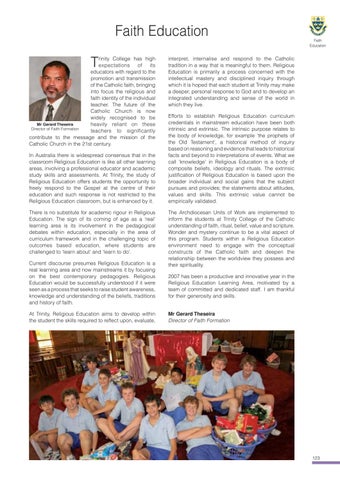Faith Education Faith Education
rinity College has high expectations of its educators with regard to the promotion and transmission of the Catholic faith, bringing into focus the religious and faith identity of the individual teacher. The future of the Catholic Church is now widely recognised to be Mr Gerard Theseira heavily reliant on these Director of Faith Formation teachers to significantly contribute to the message and the mission of the Catholic Church in the 21st century.
T
In Australia there is widespread consensus that in the classroom Religious Education is like all other learning areas, involving a professional educator and academic study skills and assessments. At Trinity, the study of Religious Education offers students the opportunity to freely respond to the Gospel at the centre of their education and such response is not restricted to the Religious Education classroom, but is enhanced by it. There is no substitute for academic rigour in Religious Education. The sign of its coming of age as a ‘real’ learning area is its involvement in the pedagogical debates within education, especially in the area of curriculum framework and in the challenging topic of outcomes based education, where students are challenged to ‘learn about’ and ‘learn to do’. Current discourse presumes Religious Education is a real learning area and now mainstreams it by focusing on the best contemporary pedagogies. Religious Education would be successfully understood if it were seen as a process that seeks to raise student awareness, knowledge and understanding of the beliefs, traditions and history of faith. At Trinity, Religious Education aims to develop within the student the skills required to reflect upon, evaluate,
interpret, internalise and respond to the Catholic tradition in a way that is meaningful to them. Religious Education is primarily a process concerned with the intellectual mastery and disciplined inquiry through which it is hoped that each student at Trinity may make a deeper, personal response to God and to develop an integrated understanding and sense of the world in which they live. Efforts to establish Religious Education curriculum credentials in mainstream education have been both intrinsic and extrinsic. The intrinsic purpose relates to the body of knowledge, for example ‘the prophets of the Old Testament’, a historical method of inquiry based on reasoning and evidence that leads to historical facts and beyond to interpretations of events. What we call ‘knowledge’ in Religious Education is a body of composite beliefs, ideology and rituals. The extrinsic justification of Religious Education is based upon the broader individual and social gains that the subject pursues and provides; the statements about attitudes, values and skills. This extrinsic value cannot be empirically validated. The Archdiocesan Units of Work are implemented to inform the students at Trinity College of the Catholic understanding of faith, ritual, belief, value and scripture. Wonder and mystery continue to be a vital aspect of this program. Students within a Religious Education environment need to engage with the conceptual constructs of the Catholic faith and deepen the relationship between the worldview they possess and their spirituality. 2007 has been a productive and innovative year in the Religious Education Learning Area, motivated by a team of committed and dedicated staff. I am thankful for their generosity and skills.
Mr Gerard Theseira Director of Faith Formation
123
